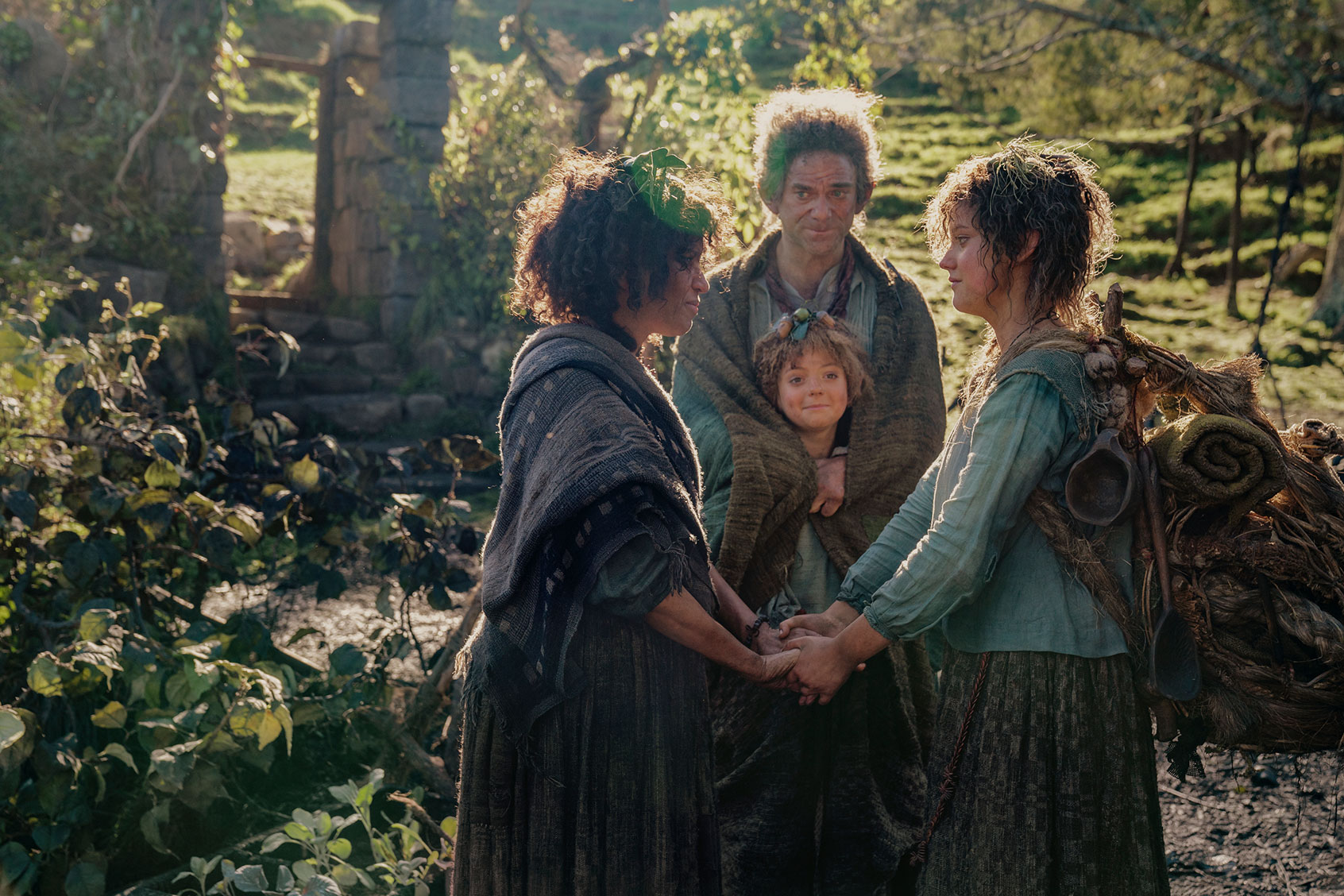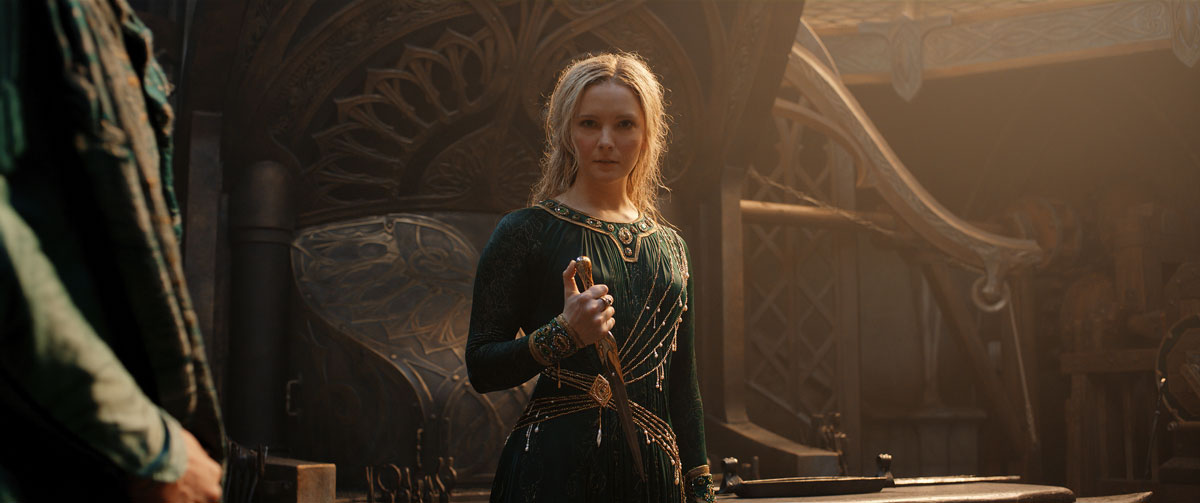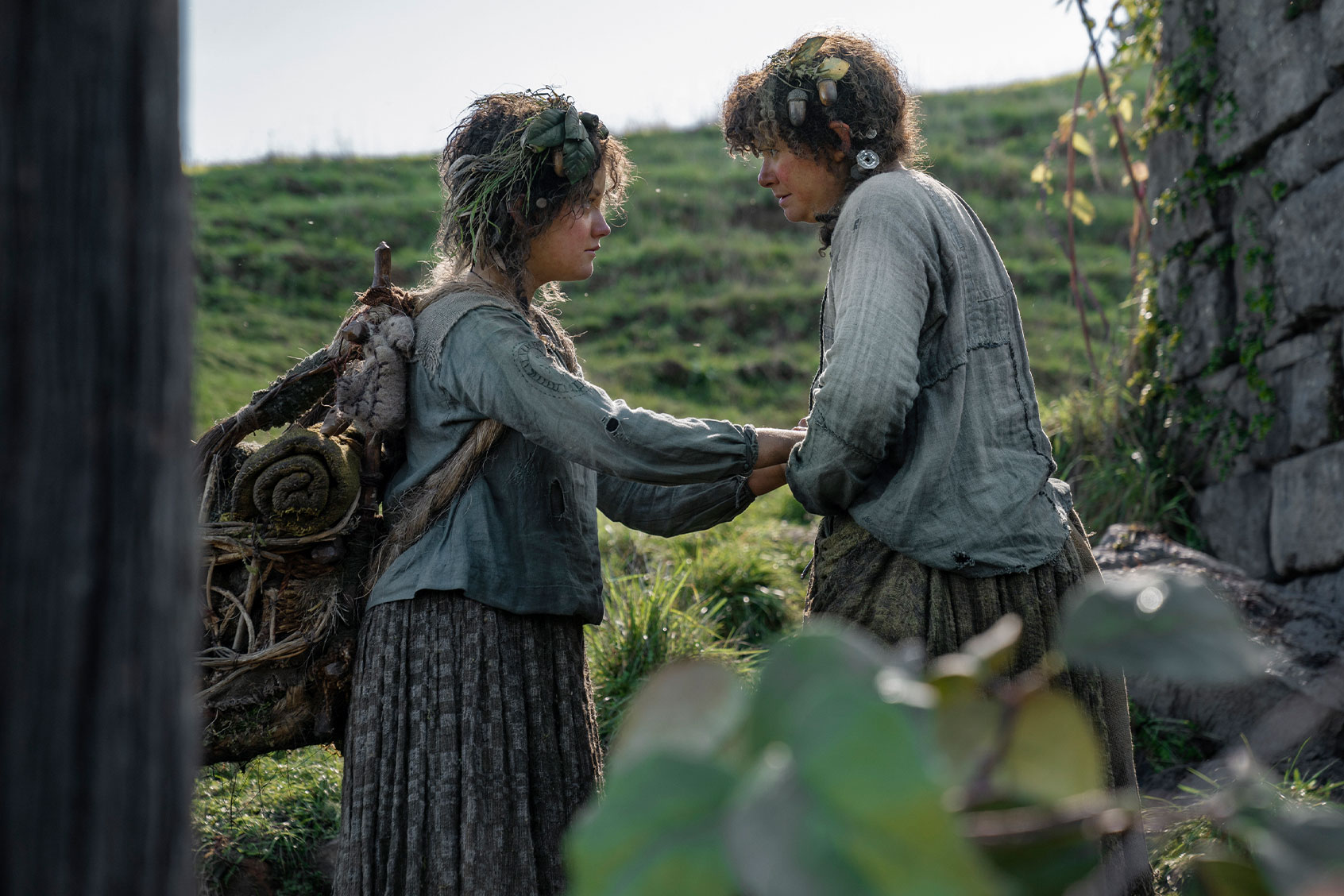Not long ago, a writer friend and I discovered we had something strange in common. As children, we had both lied to ourselves about a major character in J.R.R. Tolkien’s work.
You do the best with what you have, and what we both had was a rich fantasy series we loved reading where very few characters looked like us, not the ones on the journey, not the ones having adventures, not the ones being friends. And so we both somehow, miles and years apart, convinced ourselves that Merry was a girl. The name was close enough, we reasoned.
The Hobbit Meriadoc “Merry” Brandybuck is most definitely not female. Neither is Sam, Pippin, Frodo or any of the merry (sorry) gang. Not Gandalf. Not brave Aragorn or Fellowship joiners like Legolas. The group — they’re all guys, and while one of Tolkien’s main guiding principles was friendship, it is decidedly a bromance in these rolling smials. But Prime Video’s “Lord of the Rings” prequel would like to stand up to pass the Bechdel test, please. “The Rings of Power,” which just wrapped up its first season, has expanded the lore with the welcome addition of characters of color and that most rare of Middle-earth occurrences: female friendships.
The Season 1 finale of “The Rings of Power” has to get some messy stuff out of the way. We find out the identity of Sauron and it’s not Waldreg (he wishes) and we witness the birth of some ill-advised jewelry. The tone of the episode is decidedly dour, at least partially because some of its most vibrant characters are absent, like Bronwyn (Nazanin Boniadi) and the magnificent Disa (Sophia Nomvete). With multiple plot lines and locations that have interwoven through the series during its brief initial season, this episode chooses to spend all of its time with only three storylines.
For every stalwart woman trying to blaze a path through a man’s (or elf’s) world, it helps to have someone on the practical side.
Fortunately, one of them is Nori’s. Elanor “Nori” Brandyfoot (Markella Kavenagh), that Hobbit ancestor known as a Harfoot, is the Frodo/Bilbo piloting this ship. She has eyes as wide as Elijah Wood‘s and a matching wonder about the world, a curiosity that often gets her, and by extension, her best friend Poppy (Megan Richards), into trouble. It’s un-Harfoot-like to be questioning. They don’t stray from the path and they don’t leave people behind (except when they do). It’s one thing for young Frodo to buck his role, but for a female character to do so is another level of stubbornness and resistance.
Rebecca Bunch had Paula, Buffy Summers had Willow, and Leslie Knope had Ann (“ovaries before brovaries”). For every stalwart woman trying to blaze a path through a man’s (or elf’s) world, it helps to have someone on the practical side of things: to do the research, give the pep talks or cast the spell to bring you back from the dead. Poppy starts as a naysayer, which is a difficult role, but love of her friend causes her to trust Nori before the Harfoot’s own family even does, and by extension, to love her friend’s friend, The Stranger (Daniel Weyman). Poppy isn’t jealous when a very large man comes between them. In a true friendship, people grow and change and sometimes, give a lot of raw snails to a new somebody who shot into your community in a flaming meteor cannon.
Nori sees the good in other characters, always, and it’s likely Poppy taught her that. Nori is the closest thing to a family that Poppy, an orphan from a young age, has, and both being alone and looking out for her friend has aged her, the resigned and duty-bound older sister who won’t permit herself to have fun, to let her guard down. She can’t. Richards is a quiet revelation, pain etched on her face but only fleetingly, like a shooting star, when the Harfoots mention those the group has lost. Though she’s far from battle-tested, she wages her own internal wars, and Harfoot Poppy is the definition of brave.
 Sara Zwangobani (Marigold Brandyfoot), Dylan Smith (Largo Brandyfoot), Beau Cassidy (Dilly) and Markella Kavenagh (Elanor ‘Nori’ Brandyfoot) in “The Lord of the Rings: The Rings of Power” (Ben Rothstein/Prime Video)For a show that can bring the emotion when it wants to — Episode 6 featured some of the most stirring battles scenes since Peter Jackson‘s — the finale is surprisingly detached. Not so when Nori decides to leave her community. And her friend. Poppy pretends to be fine. She’s not, of course, and both her initial brush-off of Nori as well as her rush to say a wrenching farewell at the last moment are the most painfully real parts of this hour. It’s a genuine loss, the parting of these two, for Nori as well as for the story.
Sara Zwangobani (Marigold Brandyfoot), Dylan Smith (Largo Brandyfoot), Beau Cassidy (Dilly) and Markella Kavenagh (Elanor ‘Nori’ Brandyfoot) in “The Lord of the Rings: The Rings of Power” (Ben Rothstein/Prime Video)For a show that can bring the emotion when it wants to — Episode 6 featured some of the most stirring battles scenes since Peter Jackson‘s — the finale is surprisingly detached. Not so when Nori decides to leave her community. And her friend. Poppy pretends to be fine. She’s not, of course, and both her initial brush-off of Nori as well as her rush to say a wrenching farewell at the last moment are the most painfully real parts of this hour. It’s a genuine loss, the parting of these two, for Nori as well as for the story.
Poppy proves that the sidekick doesn’t have to be on the side, and Nori’s adventures will be weaker without her friend — even though, as Poppy says, the big guy will do for a friend in a pinch. Also, he talks now. While certain to follow The Stranger and Nori, hopefully the second season of “Rings” will return to the other Harfoots as well, both for more of Richards’ heartfelt portrayal as well as insights into the community. With their male leader dead, the group instantly listens to and follows tough love Malva (Thusitha Jayasundera) and there’s some hint that Poppy might take over the role, at least to scout paths. Could the Harfoots be . . . matriarchal?
 Morfydd Clark (Galadriel) in “The Lord of the Rings: The Rings of Power” (Courtesy of Prime Video)
Morfydd Clark (Galadriel) in “The Lord of the Rings: The Rings of Power” (Courtesy of Prime Video)
Galadriel learns the danger of trusting a certain trope of man, the mediocre ones who fall up and will drag you down with them.
“The Rings of Power” is thankfully missing most of the fuss about women in power (along with that pesky incest) that defines its bastard fantasy cousin “House of the Dragon.” The potential for that tired trope, powerful women in-fighting, is there when the queen regent (Cynthia Addai-Robinson) crosses paths with our main elf, Galadriel (Morfydd Clark). But after some brief, initial suspicion, the women characters become allies, friends. The queen regent believes Galadriel, even though it’s inconvenient for her to do so.
Galadriel is a horse girl and also, a cool girl, and as such, most of her other friends are men. She’s one of the guys: sword-wielding, relationship-resisting, romanticizing the idea of her fallen brother, and her unlikely friendship with the queen regent provides a welcome respite from the elf’s constant bravado. In the finale, Galadriel learns the danger of trusting a certain trope of man, the mediocre ones who fall up and will drag you down with them.
Want a daily wrap-up of all the news and commentary Salon has to offer? Subscribe to our morning newsletter, Crash Course.
With the ships of Númenor flying black flags of mourning, the queen regent is about to ascend to the throne, before she feels ready and now blind after being injured in battle (the show better not mess this up). Minor character Eärien is at the right place at the right time and has likely been given a glimpse of something huge thanks to the dying king. Pay no attention to the palantír behind the curtain, said no Eärien ever.
And as Galadriel is instrumental in doing a bad thing for a good reason (maybe), with the looming second season, women are posed to gain even more of that elusive power of the title. It’s best if they have their female friends with them.

